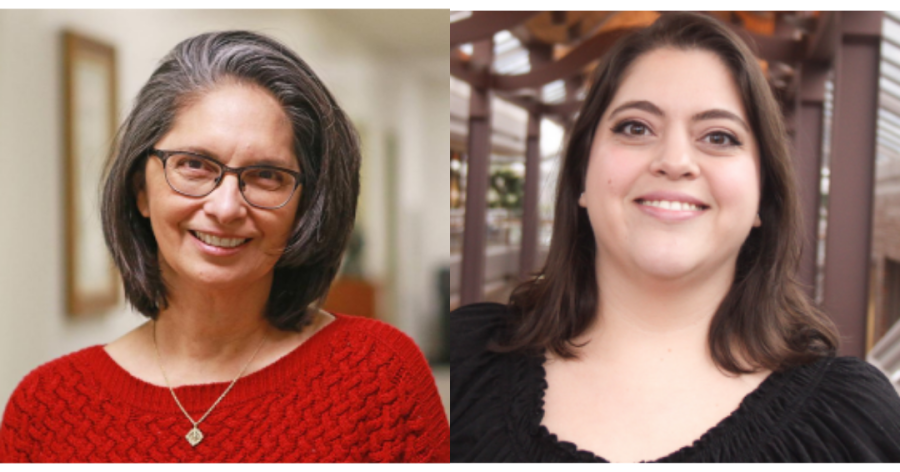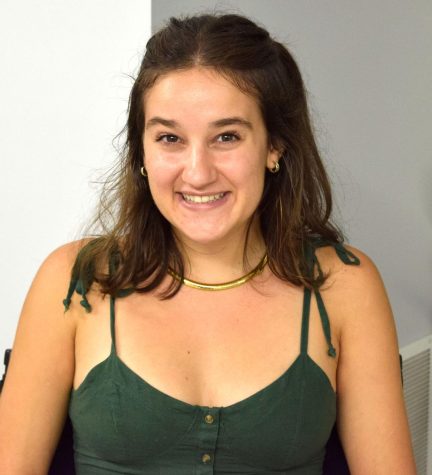The Minds Met: Here’s What Happened
April 6, 2022
Two great minds on the campus of Wayne State College met Tuesday, April 5 to discuss the term “birthing persons.”
The student group Wild for Life hosted the deliberation by professors Teresa Morales and Becky Zavada, with junior Elias Reiter acting as the moderator.
Along with punch and cookies, Wild for Life invited students, faculty and community members to listen to the discussion and ask questions to the two speakers.
Reiter started the night with a welcome address and moved on to an introduction of the two professors: Morales, a professor of communication studies, and Zavada, a professor of philosophy.
This meeting of the minds event started long before picking a date. Morales wrote a rhetorical analysis paper last semester regarding the term “birthing persons.” This term, she explained, came from a presentation from the Biden Administration to a health group last June. In this presentation, White House staffers outlined the atrocities against African American mothers in the United States.
According to a press release by the Center for Disease Control in 2019, “Black, American Indian and Alaska Native (AI/AN) women are two to three times more likely to die from pregnancy-related causes than white women.”
To combat this, the White House put out an initiative that prioritizes maternal health such as allocating around $200 million to help end high maternal mortality and lessen disparities of “birthing persons” based on race. This terminology, meant to bring transgender and nonbinary people into the conversation, missed the mark of incorporating the intended inclusivity, according to Morales.
“For women worldwide, [giving birth is] the single most dangerous thing she does in her life,” Morales said. “Calling her just a person who gives birth, it reduces women to incubator status and a medical procedure. And it’s more than that. It’s simply more than that.”
Furthermore, Morales’ paper analyzes the word mother using its connotative meaning, through religion, emotions, etymology and anthropology. She also understands that not every pregnant person defines as female, but rather than “birthing person” acting as the umbrella term, she gives “mother” that status.
“Now our language is constantly adjusting and reformulating and changing,” Morales said. “We create new words, why can’t we create a better description? Why didn’t the policy say, ‘mothers and other breathing persons?’ I don’t know. I am not a birthing person.”
Wild for life invited Morales to present her paper to the group, but the professor wanted to create a discussion instead of “speaking to the choir.” Thus, president for the organization Bridget Sisco asked Zavada if she would participate and offer opposing viewpoints.
From Zavada’s perspective, the term in question offers a shortened description of people who give birth. She expressed that she does not feel attached to “birthing person,” and welcomes new terminology, but she sees how this framing of policy wishes to include all mothers, women, transgender men, nonbinary, and intersex individuals, excluding no one. As Morales sees “mother” as the umbrella term, Zavada sees “birthing person,” as some people that give birth certainly do not define as a mother.
In her criticism, Zavada described Morales’ perception of the term “birthing person” as a misunderstanding. According to the philosopher, the term is not meant to act as a replacement for the sacrality of motherhood, instead it offers correct inclusion in specific contexts.
After presentations from both sides, audience members asked questions to either or both parties. Both Morales and Zavada saw audience participation as the most important aspect of the event.
“One thing that I always want is to help students learn to think critically about things,” Zavada said. “Often in American discourse, if you can’t put it on the back of a bumper sticker [or] if you can’t sum it up in a sentence, then people just lose interest or aren’t willing to take the time to really dig into these kinds of issues.”
The pair also hope to inspire other students and faculty members to hold their own meetings of the minds, inviting thoughtful discussions free of the restrictions of a formal debate and free of accusatory anger.
“I want people to see that we can actually talk about controversial things,” Morales said. “Without screaming matches, anger, accusations, riots and protests, we can do this. It can be done. It should be done.”









Susan Boust • Apr 25, 2022 at 10:39 am
I enjoyed this activity and hope you will hold another dialogue. You might consider partnering with Braver Angels to streamline the meeting process. https://www.goacta.org/initiatives/college-debates/